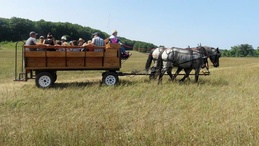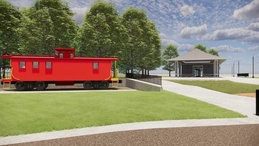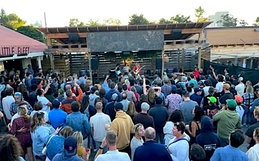Inside Iraq: Sgt. Robert Bailey on what it‘s like Serving with the Military in Mosul
Nov. 10, 2004
With the national elections over, America is once again turning its attention to Iraq, where a U.S. assault on the Sunni insurgent stronghold of Fallujah is underway.Robert Bailey of Traverse City is watching those preparations for battle with grave interest and concern. As a member of the 24-member National Guard 1440th Engineering Detachment of Firefighters from Camp Grayling, he recently returned from Iraq after serving for six months in the city of Mosul in the Kurdish-held north.
This was the second time around for Sgt. Bailey. He served as a firefighter during Desert Storm in 1989-93 and also spent five years as an MP (military police).
“I signed up on November 11th last year to go back over to Iraq with my unit because I had been to Desert Storm,” he says. “I thought I had something to contribute and wanted to support them.”
Like many volunteers in the military, Bailey, 34, says he was deeply affected by the 9/11 attacks, and also by what he saw in the first Gulf War.
“I was in Saudi Arabia during Desert Storm and got up to Kuwait for a day and saw a lot of ground damage,” he recalls. “I figured we’d be back in 10 years.
“I know what the soldiers sacrifice and it’s a lot,” he adds. “Not only that, but it’s about my family and 9/11. After 9/11, that really affected me and I wanted to do something. I was at work and heard that the unit got activated, so I left work early, made a few phone calls and was back in the next day.”
ON TO IRAQ
So it was that Bailey left his job as a prison guard at the Pugsley Correctional Facility near Kingsley last November for deployment as a firefighter in Iraq. He was honorably discharged this year to return home on a family matter, but given his experience, has some insights on what it’s like to serve in one of the most dangerous places on earth for an American soldier.
Bailey notes that on his very first day in Iraq, his base was under attack by mortar fire -- something which the troops came to accept as commonplace. “We were getting mortars sometimes every day, probably every other day,” he says.
NE: What was it like when you arrived in Iraq?
Bailey: I was stationed at Mosul International Airport in the northern part of the country. We were responsible for crash rescue and putting out fires. Three days after I arrived in Iraq, we had three inches of snow, but there’s a lot of green grass and rolling hills there. It’s probably one of the better places to serve in the country. They call it the Pearl of the North.
NE: What’s the morale like among our soldiers?
Bailey: Compared to Desert Storm it was much more organized. I was really shocked that the food’s excellent. Early on, some general had a meeting and asked if the soldiers had any complaints and one of them was the food. A week later that all improved -- this is what I was told by the other soldiers. So we had a salad bar, ice cream bar, dessert bar, main food line, fast food line... Morale seemed to be up; they had a dance and a dj on Friday nights and probably a $2 million gym for the soldiers to work out in. It’s really great for the troops. I never got up to Baghdad or Fallujah, but from what I heard, they have a lot of the same thing there.
NE: Were the Iraqi people happy to see you?
Bailey: The ones that I worked with, yeah. I didn’t have a lot of contact with the Iraqi civilians downtown because we worked at the airfield training Iraqis as firefighters. Most of them are Kurdish and they’re real friendly to us. We celebrated our Fourth of
July with them, because when power was turned back over, that was a good day for them (the Kurds were persecuted by Saddam Hussein).
We had a great big potluck dinner; we brought food, they brought food and some of the soldiers played soccer with them. We helped one guy buy a car, an $800 car our unit collected money for. And a lot of people in our unit get baby clothes and other stuff from their families back home to give to the Iraqis for their kids.
The Kurds have always been kind of friendly, but there are Sunni problems there too.
NE: On the other hand, you say there were mortar attacks. Did that happen from the get-go?
Bailey: Yeah, ever since we went in there they either set them up on fuses or would just point them from outside our perimeter. They’re not very good shots. Downtown, I heard of them putting mortars in the back of pickup trucks. They’d fire them off and then blend in with the crowd.
Our base was located in a big open field with a fence and towers, but mortar rounds can go for miles. For the most part you don’t worry about it. At times I’d go to bed and think, what if we get hit by a mortar? But you kind of steer your mind to other things because you’ve got to get some sleep.
Suicide bombers -- I remember one morning about five after 8:00 at our south gate, a bomb went off. It was pretty chaotic. Three U.S. soldiers were injured and one Iraqi civilian in that bomb. The bomber was a female who had a pickup truck full of UXOs (unexploded ordnance) of bombs, mortars and stuff left over from the Saddam regime. It wasn’t pretty.
NE: Have our guys gotten more mistrustful of the civilians?
Bailey: Yeah, they’re always on edge. You don’t know who the enemy is for the most part. I mean technically, even the guys we work with -- the firefighters -- I can never really 100 percent trust them. There were a couple of good guys that I’d talk to about religion, or you know, they were Muslims and had families, but I personally had problems sometimes eating their food and wondering if it was safe or if they’d try to put something in it.
But, they (U.S. troops) check them pretty good every morning when they come in the gates. It’s a team effort. The MPs are highly trained to search civilians coming in for bomb devices. You never know with the explosive belts, but they have a way to search them now. Our troops are learning a lot over there as far as that kind of stuff, but you can’t get them all.
NE: Have you known anyone who was hurt?
Bailey: I know a chaplain over there who got hit with an IED (improvised explosive device) and a few other people, but no one in our unit has been injured.
Three police stations in downtown Mosul got hit one morning at the same time. I talked to some Iraqi firefighters who were there and they said it was just horrific.
With the firefighters we work with, their main concern is being seen arriving or leaving the airport and being followed home by the insurgents. They’re concerned for their families.
NE: Do the Kurds you work with ever say what life was like under Saddam?
Bailey: We have a few interpreters and try to communicate. It seems the general consensus is that they’re happy that Saddam as removed. I know they want control back of their country. I know that the people I talked to don’t want us to leave -- not yet, because things would get worse.
NE: Have you had any crashes or big fires to respond to?
Bailey: We had several grass fires, but mostly we drive along the roads and let them burn themselves out because we don’t know what’s out there -- mines or whatever. We let the fire come up to the road and then put it out. As for structural fires, we’ve had a few containers catch on fire. The Iraqis use 220 electrical and the insulation on the wires is real thin. So that’s a real issue and we’ve put out a few buildings.
NE: Do you get special training in watching out for the bombs that have killed a lot of our troops?
Bailey: Before we left, we got training on that type of issue. We get training on IED roadside bombs, unexploded ordnance and suicide bombers and what to look for. But nothing’s a for sure thing.
NE: In the case of the suicide bomber, why would a woman blow herself up like that? That seems bizarre.
Bailey: That’s very uncommon in their religion. They say that people train for that over there, but I like people and the only thing I can think of is that their lives are threatened. Maybe the insurgents or bad guys are at their house with knives to their kids or something. Maybe they say you’d better go kill two or three Americans today and here’s a vehicle and if you don’t do it, we’ll kill your kids. If you do it, then your family will be taken care of. That’s the only thing that would make sense to me, why someone would do something like that -- because of their family they’d blow themselves up.
NE: If you’re rebuilding the country and trying to make Iraq better, you wonder why there would be insurgents there.
Bailey: We got Saddam out of power and it’s going to be a better place, but -- and this is my opinion -- we’re keeping the insurgents and the terrorists out of America. They want to kill Americans. I’m sure there are a few of them here, but for the most part, they can go to Iraq to do that.
That’s why I respect the soldiers there, because they’re putting their lives on the line for their families, friends and for America. And they sacrifice a lot. A lot of them get divorced, lose an arm or a leg, or sometimes the ultimate sacrifice and lose their life. They’re really doing a good job with what they have to work with.
NE: How do you think things are going there for us?
I came back on the 15th of August and I can tell you that the morale for our unit was great. It’s a good bunch of guys who work there with quite a bit to do and good communication with our families.
I came back to see a totally different war on the news because they focus on the bad. I saw a lot of good stuff there. I know that things have heated up there too a little bit since then. I want to see the troops come home, but I know they’ve got a job to do.
SIDEBAR
Life on the Base
Email and the Internet provide a link back home
As Robert Bailey notes above, U.S. troops have good food as well as entertainment and exercise facilities at their base in Mosul. There was even a new salon and a massage service being established when he left Iraq.
Other comforts which make a soldier’s life easier are the widespread use of the Internet, email and better phone connections to stay in touch with family and friends back home. Bailey notes that by comparison, he was socked with a $1,300 phone bill when he returned from Desert Storm in the early ’90s.
Soldiers live in small pods called containers which house two at a time. Fortunately, these are air conditioned, because summers in Iraq reach temperatures of 115-125 Fahrenheit, with nighttime averages of 85 degrees. “There are also quite a few mosquitos because it’s kind of swampy up there and there are problems with malaria,” he says.
For the long haul, Bailey wonders what will happen once the military exhausts its supply of reservists. “Our orders were for two years, but one year for National Guard troops is too long,” he says, adding that many in the service have lost their businesses or careers back home. “I think our country is going to be hurting another four years from now if our troops don’t get a raise.”
Trending

A Time Capsule Weekend in Port Oneida
What was life like in northern Michigan in the late 1800s and early 1900s? Find out at the Port Oneida Fair, Aug. 8 and 9 at… Read More >>
A New Vision, A New Trailhead
This summer, the nonprofit Thompsonville Area Revitalization Project (TARP) broke ground on phase one of their Thompsonville… Read More >>
Grooving at All Call
Come one, come all—the All Call Music Festival is back for its fourth year on Aug. 9! This one-day jam takes place at … Read More >>


